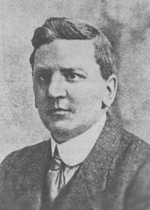Dawson Thomas Reiner (28.11.1889 – 16.12.1951)
 English composer, pioneer of both Fairy Problems and Retrograde Analysis. For fairy problems he invented new pieces: Grasshopper (1912), Neutral Man (1912), and Nightrider (1925). He codified new rules as the Maximummer (1913) and various kinds of Series-Movers. He used non-orthodox boards. In 1915 he wrote Retrograde Analysis, which turned to be the first book on the subject. Thus he completed the work on the project which was commenced by Hundsdorfer some years earlier. Dawson conducted columns in several newspapers and periodicals. From 1919 to 1930 he worked in the Chess Amateur newspaper. He had a column devoted to fairy chess. Since 1926 he edited the Problemist, the problem section of the British Chess Magazine. There he devised and published a systematic terminology for problem themes. Dawson founded and edited also the Problemist Fairy Supplement (1931-1936), continued as Fairy Chess Review (1936-1951). He wrote 5 books on fairy problems: Caissa’s Wild Roses (1935), C.M. Fox, His Problems (1936), Caissa’s Wild Roses in Clusters (1937), Ultimate Themes (1938), Caissa’s Fairy Tales (1947) Dawson found it difficult to understand the problemist’s idea of beauty because it is not susceptible to precise definition. “The artist talks of ‘quiet’ moves, oblivious that they are White’s most pulverizing attacks! This aesthetic folly, reverence, response, thrill, to vainglorious bombast runs throughout chess”. He worked rapidly and worked out about 6.500 compositions. His genius did not prevent him to meet his friends. He received the visitors and spent hours explaining them his ideas with tolerance and kindness. He won many prizes, and his work is aimed to encourage others, to attract other people to fairy chess. He composed not for fame, but to entertain himself. He said: “We do things for ourselves alone”. Being a chemistry graduate, Dawson worked in the rubber industry and was the head of the Intelligence Division of the British Rubber Manufacturers, for this purpose he founded a library. His health was not good during his last years of life, he died from a stroke.
English composer, pioneer of both Fairy Problems and Retrograde Analysis. For fairy problems he invented new pieces: Grasshopper (1912), Neutral Man (1912), and Nightrider (1925). He codified new rules as the Maximummer (1913) and various kinds of Series-Movers. He used non-orthodox boards. In 1915 he wrote Retrograde Analysis, which turned to be the first book on the subject. Thus he completed the work on the project which was commenced by Hundsdorfer some years earlier. Dawson conducted columns in several newspapers and periodicals. From 1919 to 1930 he worked in the Chess Amateur newspaper. He had a column devoted to fairy chess. Since 1926 he edited the Problemist, the problem section of the British Chess Magazine. There he devised and published a systematic terminology for problem themes. Dawson founded and edited also the Problemist Fairy Supplement (1931-1936), continued as Fairy Chess Review (1936-1951). He wrote 5 books on fairy problems: Caissa’s Wild Roses (1935), C.M. Fox, His Problems (1936), Caissa’s Wild Roses in Clusters (1937), Ultimate Themes (1938), Caissa’s Fairy Tales (1947) Dawson found it difficult to understand the problemist’s idea of beauty because it is not susceptible to precise definition. “The artist talks of ‘quiet’ moves, oblivious that they are White’s most pulverizing attacks! This aesthetic folly, reverence, response, thrill, to vainglorious bombast runs throughout chess”. He worked rapidly and worked out about 6.500 compositions. His genius did not prevent him to meet his friends. He received the visitors and spent hours explaining them his ideas with tolerance and kindness. He won many prizes, and his work is aimed to encourage others, to attract other people to fairy chess. He composed not for fame, but to entertain himself. He said: “We do things for ourselves alone”. Being a chemistry graduate, Dawson worked in the rubber industry and was the head of the Intelligence Division of the British Rubber Manufacturers, for this purpose he founded a library. His health was not good during his last years of life, he died from a stroke.



